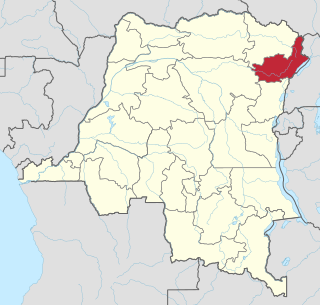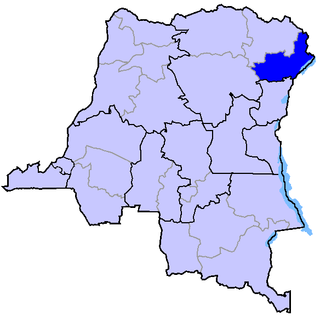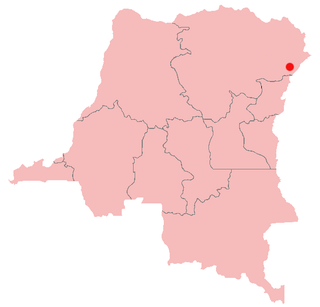Related Research Articles

Orientale Province is one of the former provinces of the Democratic Republic of the Congo and its predecessors the Congo Free State and the Belgian Congo. It went through a series of boundary changes between 1898 and 2015, when it was divided into smaller units.

Ituri is one of the 21 new provinces of the Democratic Republic of the Congo created in the 2015 repartitioning. Ituri, Bas-Uele, Haut-Uele, and Tshopo provinces are the result of the dismemberment of the former Orientale province. Ituri was formed from the Ituri district whose town of Bunia was elevated to capital city of the new province.

The Hema people or Bahema (plural) are an ethnic group of Nilotic origin who are concentrated in parts of Ituri Province in the eastern Democratic Republic of the Congo.

The Ituri conflict is an ongoing conflict between the agriculturalist Lendu and pastoralist Hema ethnic groups in the Ituri region of the north-eastern Democratic Republic of the Congo (DRC). While the two groups had fought since as early as 1972, the name 'Ituri conflict' refers to the period of intense violence between 1999 and 2003. Armed conflict continues to the present day.

Operation Artemis, formally European Union Force (EUFOR) Democratic Republic of the Congo, was a short-term European Union-led UN-authorised military mission to the Democratic Republic of the Congo during the Ituri conflict. ARTEMIS is considered the first military operation led by the EU, the first autonomous EU operation, the first rapid response mission of the EU, first operation outside Europe, first operation applying the principle of the framework nation and first example of "relay operation", conducted in cooperation between the EU and the United Nations. The deployment of EUFOR troops quickly decreased the conflict's intensity. It marked the first autonomous EU military mission outside Europe and an important milestone in development of the European Security and Defence Policy.
Ituri may refer to:

The Front for Patriotic Resistance in Ituri is a Bunia-based armed militia and political party primarily active in the south of the Ituri Province of northeastern Democratic Republic of the Congo.
Petronille Vaweka is a humanitarian NGO activist and was the interim chairperson of the Ituri Interim Assembly of Ituri Interim Administration, while in transition from the status of a district of Orientale Province to a province of the Democratic Republic of the Congo. She worked with the Ituri Pacification Commission in 2003, which helped establish the assembly. In addition, she was elected as Ituri's representative to the National Assembly.
The Ituri Interim Assembly is a 32-member legislative body that serves as the legislature of Ituri region of the Democratic Republic of Congo. It was created in April 2003 by the Ituri Pacification Commission, a UN-sponsored commission that assessed the current state of conflict in the Ituri region. Petronille Vaweka is the chairperson of the Assembly and represents the province in the National Assembly in Kinshasa.

The Ituri Interim Administration is an interim body that administers the Ituri region of the Democratic Republic of Congo (DRC). It was established in 2003 by the Ituri Pacification Commission and supported by the UN mission in the DRC.

Haut-Congo Province was a province of the Republic of the Congo (Léopoldville), now the Democratic Republic of the Congo. It was formed in April 1962 from part of the Orientale Province. In 1966 it was merged back into the reconstituted Orientale Province.

United Nations Security Council resolution 1468, adopted unanimously on 20 March 2003, after recalling previous resolutions on the situation in the Democratic Republic of the Congo, the Council welcomed an agreement on the establishment of a transitional government and requested an increased presence of the United Nations Mission in the Democratic Republic of Congo (MONUC) in the Ituri region in the east of the country amid escalating violence.

United Nations Security Council Resolution 1484, adopted unanimously on 30 May 2003, after recalling previous resolutions on the situation in the Democratic Republic of the Congo, the Council authorised Operation Artemis in Bunia, the capital of Ituri Province, amid the deteriorating security situation in the area.

United Nations Security Council resolution 1489, adopted unanimously on 26 June 2003, after recalling Resolution 1291 (2000) and other resolutions on the situation in the Democratic Republic of the Congo, particularly resolutions 1468 (2003) and 1484 (2003), the Council extended the mandate of the United Nations Mission in the Democratic Republic of Congo (MONUC) until 30 July 2003.
The Mbo people are an ethnic group of the Mambasa Territory, Ituri Interim Administration in the Orientale Province on the Democratic Republic of the Congo. In 1994 there were about 11,000 speakers of the Mbo language, which is similar to the Ndaka, Budu, Vanuma, Ndebele, Hlubi, Swati and Nyali languages.

Ituri District, later Kibali-Ituri District, was a district of the Belgian Congo and the Democratic Republic of the Congo. It roughly corresponded in area to the present Ituri Province.

Haut-Uele District was a district of the Belgian Congo and the Democratic Republic of the Congo. It was formed from part of Uele District in 1912. It roughly corresponded in area to the present Haut-Uélé province.

Bas-Uele District was a district of the Belgian Congo and the Democratic Republic of the Congo. It was formed from part of Uele District in 1912. Later it was merged back into Uele District, then split out again. There were various boundary changes. It roughly corresponded in area to the present Bas-Uélé province.

Nord-Kivu District was a district of the Belgian Congo and the Democratic Republic of the Congo. It roughly corresponded in area to the present North Kivu province.

CODECO is a loose association of various Lendu militia groups operating within the Democratic Republic of the Congo. The name is an abbreviation of the group's lesser-known full name, the Cooperative for Development of the Congo, sometimes also styled the Congo Economic Development Cooperative.
References
- ↑ Itano, Nicole (24 June 2003). "In remote part of Congo, normalcy inches forward". The Christian Science Monitor . Retrieved 10 November 2010.